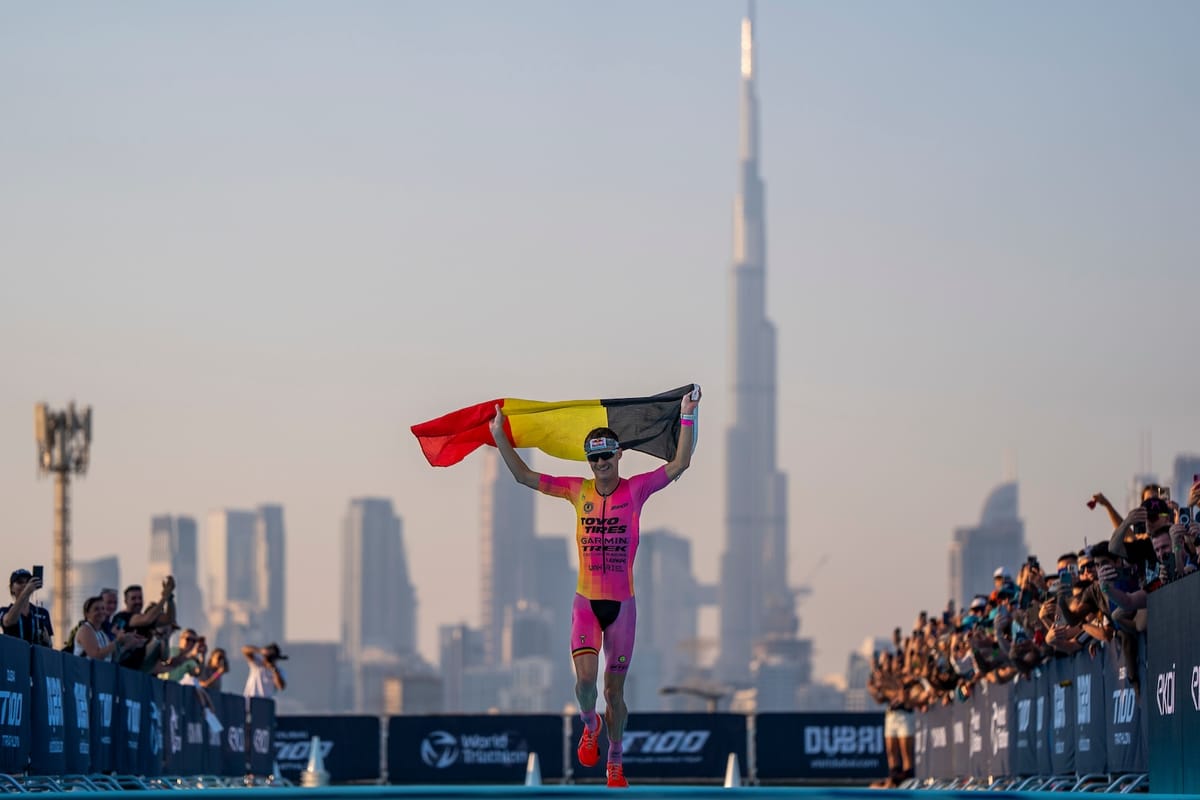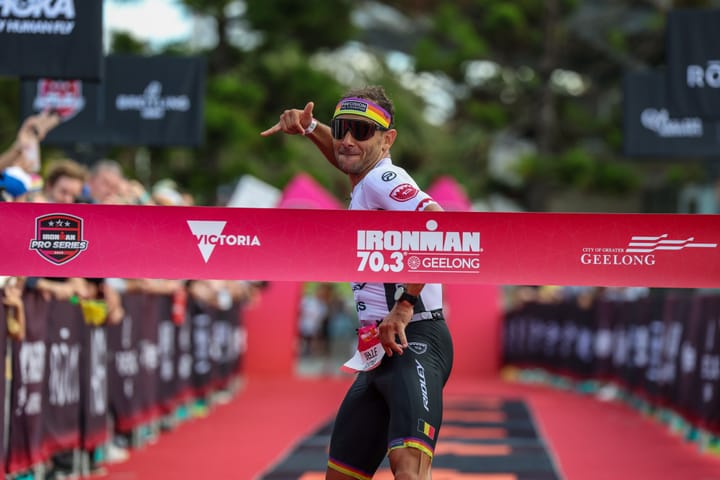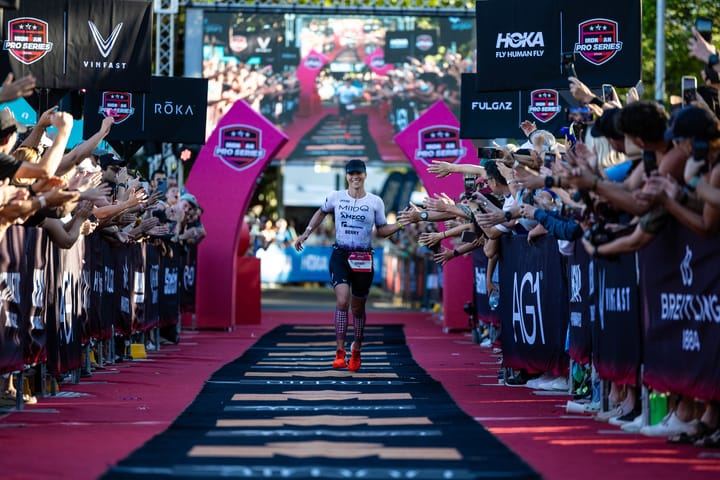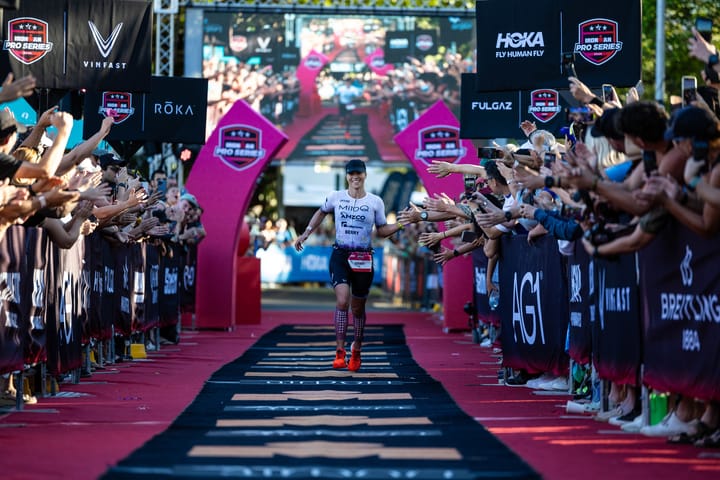Marten Van Riel Makes History as First T100 World Champion in Dubai Epic
Belgium's Marten Van Riel outdueled Rico Bogen in brutal Dubai heat to win both the Grand Final and inaugural T100 World Championship, with Alistair Brownlee surging to third.

In the scorching heat of Dubai, Belgium's Marten Van Riel etched his name into triathlon history, becoming the first-ever men's T100 World Champion with a masterful performance that showcased both tactical brilliance and raw power. Just 24 hours after Taylor Knibb claimed the women's crown in equally brutal conditions, Van Riel emerged victorious from an elite field to claim both the inaugural series title and the Dubai Grand Final victory, racing in temperatures that soared to 45°C (113°F).
The stakes couldn't have been higher at the season finale, with a $210,000 winner's purse and the honor of being crowned the first T100 World Champion on the line. Van Riel entered the race as series leader, knowing a podium finish would secure him the overall title, but the Belgian star wasn't content to play it safe.
In a remarkable display that reflected the season-long excellence that brought him two previous T100 victories, Van Riel out-duelled Germany's Rico Bogen in the closing km's of the run, while two-time Olympic champion Alistair Brownlee mounted a thrilling late-race surge to claim the final podium spot from a struggling Kyle Smith.
The brutal conditions turned Dubai's Maidan course into a true test of both physical and mental ability to remain strong and calm - if at all possible. The 31°C water temperature—described by athletes as "swimming through treacle"—set the tone for what would become one of the most demanding races of the season.
The Swim
Under Dubai's unrelenting sun, the men dove into water that felt more like a warm bath than a race venue, with temperatures hovering at 31°C. Despite pre-race predictions that the extreme conditions might slow the pace and fragment the field, the swim proved surprisingly tactical, with a larger-than-expected lead group forming.
Series leader Marten Van Riel, after a cautious start, quickly established himself near the front alongside Aaron Royle and Alistair Brownlee. The experienced Brownlee showed his tactical awareness early, removing his swim cap halfway through the first lap to better manage the oppressive heat—a veteran move that several others, including Germany's Rico Bogen, would later emulate.
The two-lap course, featuring an Australian exit, saw a lead pack of 13 athletes emerge from the first lap, including all the pre-race favorites. This group included Van Riel, Brownlee, Kyle Smith—whose white Christian Blummenfelt-inspired suit stood out in the pack—and Rico Bogen, who had struggled with swimming in previous races but showed marked improvement when it mattered most.
Magnus Dlev, a strong medal contender, found himself just off the back of the main group, exiting the water 1 minute and 15 seconds behind. However, the day's biggest challenge came for Sam Long, who despite the relatively controlled pace, found himself over 4 minutes adrift by the end of the swim—a deficit that would prove decisive in the intense Dubai heat.
The first transition saw athletes immediately adapting to the conditions, with many taking extra seconds to don socks or adjust equipment for the technical bike course ahead. Van Riel, showing his experience, had already planned ahead by wearing socks during the swim, saving precious seconds in what would become a day where every detail mattered.
The Bike
The technical 80km bike course quickly became a showcase of both power and precision. A lead group of six established themselves at the front: Van Riel, Rico Bogen, Alistair Brownlee, Fred Funk, Matius Maier, and Kyle Smith. The searing heat, with ground temperatures reaching 50°C, added an extra layer of complexity to the already demanding course.
The early kilometers featured a long, straight time-trial section that tested pure power before transitioning into the technical heart of the course. Newly married Fred Funk, wearing race number six, seized the initiative early, driving the pace and forcing his competitors to respond. His aggressive riding, while impressive, drew close attention from technical officials monitoring the strict 20-meter drafting zones.
The day's most significant drama unfolded when Magnus Ditlev, having methodically reduced his deficit to just 39 seconds, encountered a mechanical issue with his seat post. The Danish star, winner of the inaugural T100 in Miami and known for his bike prowess, handled the setback with characteristic composure. However, the repair cost him precious minutes, pushing him back to over two minutes behind the leaders—a gap that would prove insurmountable even for an athlete of his caliber.
Mechanics called into action!
— T100 Triathlon World Tour (@t100triathlon) November 17, 2024
Magnus Ditlev was flying but he has an issue and loses crucial time 😫
📺 WATCH DUBAI T100 LIVE: https://t.co/5TiASDaWI9 pic.twitter.com/HtpQ7sfcsL
The complex drafting rules created an interesting tactical battle among the leaders. At one point, Funk found himself forced to surge all the way from fifth position to the front when caught in no-man's land between legal drafting zones.
The technical sections, particularly around the Maidan Center, repeatedly tested the athletes' handling skills. Kyle Smith, notably choosing to carry extra hydration in the brutal conditions, suffered a setback when he lost a bottle over one of the course's notorious speed bumps - not surprising given this happened in the women's race.



Marten Van Riel and Rico Bogen, who would later battle for the world title, both displayed tactical maturity during the bike leg. Unlike some of their previous races, neither attempted to force a break, instead staying vigilant near the front while conserving energy for the run ahead. Van Riel, in particular, seemed content to monitor his position from fifth or sixth wheel, knowing a podium finish would secure his overall series victory.
The heat began taking its visible toll as salt stains appeared on the athletes' kits, with Fred Funk's suit showing particularly evidence of the extreme conditions - or was that post-wedding alcohol? The athletes' heart rates, displayed on the live coverage, consistently showed efforts above 85% of maximum despite the tactical nature of the riding—a clear indication of the thermal stress they were under.

As the bike leg entered its final phase, the lead group remained intact, setting the stage for what would become an epic battle on the run. Meanwhile, Magnus Dlev had recovered from his mechanical to begin methodically picking off riders, showing the kind of measured effort that had earned him his reputation as one of the sport's strongest cyclists.
The Run
The 18km run under Dubai's afternoon sun quickly evolved into a battle of attrition. Coming out of T2, Rico Bogen—historically vulnerable in hot conditions—surprised everyone by immediately taking the initiative, pushing a pace that had the front group running at an astonishing 2:58/km. Van Riel and Smith matched his early surge, while Alistair Brownlee, delayed briefly by having to return for a shoe left outside his transition box, found himself 17 seconds adrift of the leaders.
The first major shake-up came approximately 6km into the run when Van Riel made his initial move, creating a selection that only Bogen could follow. Kyle Smith, one of the pre-race favorites, began to fade, creating an opportunity for Brownlee, who was methodically working his way through the field with the patience of a two-time Olympic champion.
Ali Brownlee drops a shoe into T2 and it costs him valuable seconds!
— T100 Triathlon World Tour (@t100triathlon) November 17, 2024
📺 WATCH DUBAI T100 LIVE: https://t.co/5TiASDaWI9 pic.twitter.com/W5ML4rnD6G
As the race entered its final third, the story became one of two contrasting battles: Van Riel and Bogen dueling for the win and inaugural world title, while behind them, a fascinating contest unfolded between Smith and Brownlee for the final podium position. The intensity of the heat was evident in the athletes' form, with even the typically smooth-running Van Riel showing signs of fatigue as his head began to bob with each stride.
The decisive moment came with just over 2km remaining. Van Riel, showcasing the same finishing power that had earned him victory in San Francisco earlier in the season, launched what would prove to be the winning move on a downhill section. Bogen, who had already rewritten expectations about his performance in the heat, finally showed his first signs of vulnerability as the gap opened to 15 seconds.
Behind them, the battle for third place reached its dramatic climax when Brownlee caught Smith with just over a kilometre remaining. In a moment of high drama, Brownlee stumbled and fell while attempting to make the pass, but showed remarkable composure to quickly regain his feet and complete the overtake. The veteran's surge in the final kilometre put the podium position beyond doubt, marking his first T100 podium finish at the most prestigious race of the season.
ALISTAIR BROWNLEE TRIPS 😱
— T100 Triathlon World Tour (@t100triathlon) November 17, 2024
The double Olympic champ hits the concrete but gets back up and puts in a huge effort to pass Kyle Smith for a place on the podium! pic.twitter.com/O9fhC6rPxN

Van Riel crossed the finish line in 3:09:17, securing both the Dubai victory and the overall T100 World Championship. His victory celebration reflected both relief and joy as he became the first male athlete to write his name in the T100 history books. Bogen's second place, perhaps the most impressive performance of his career in hot conditions, helped secure him third place in the overall series standings. Brownlee's third-place finish, completing his journey from injury-plagued seasons to the podium provided a fitting conclusion to the men's race.





Comments ()